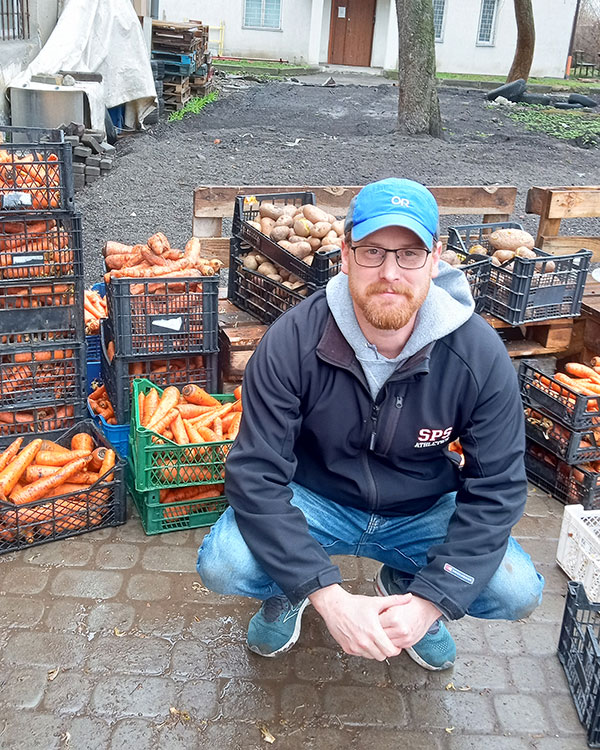

A member of the Humanities faculty, Dr. Joshua Duclos’ trip to teach a philosophy seminar in Lviv was his fourth visit to the country since 2022.
BY KRISTIN DUISBERG
St. Paul’s School Humanities Teacher Josh Duclos spent a week of his Spring Break in Lviv, Ukraine, teaching a free seminar, “Philosophy and Ethics of History,” to students at Ukrainian Catholic University. It was a class he’d been planning for some time — but not necessarily one he’d intended to offer in March. Following Ukrainian President Volodymyr Zelenskyy’s February visit to the United States, however, Duclos felt compelled to return to the country he had traveled to three times since its Feb. 24, 2022, invasion by Russian forces to offer a valuable opportunity to college students in the occupied nation: the chance to engage with a critical topic related to their studies.
”If I was a medical doctor, I’d volunteer at a hospital or a clinic. If I was a translator, I would try to put my linguistic skills to use,” Duclos says. “As for teaching philosophy during wartime, you might think, ‘why is anyone wasting their time on that?’ But thinking carefully and critically is something these students are very serious about, and I think that’s wonderful. The next generation of Ukrainians, the ones that survive the war, are going to be the ones shaping their country’s future. And I would love that to be a generation of people who respect reason, argumentation and truth.”

It’s a sensitive topic when you’re doing the philosophy of history. And it’s totally forgivable if, when you’re fighting for your survival, you just go to flag-waving and patriotism. But these students really were eager to critically examine their country’s difficult history and happy to confront thorny ethical questions about the past.
Duclos developed the seminar, which he taught from March 12 through March 15, in partnership with Orysya Bila, head of Ukrainian Catholic University’s philosophy department. The class brought together a dozen philosophy and history majors from Ukrainian Catholic and Ivan Franko National universities, including some students who aren’t currently able to leave the country and may not be able to for the foreseeable future. Bila describes Duclos’ time in Lviv as “particularly valuable given the current context in Ukraine, where questions of history, justice and moral responsibility are of urgent importance,” and his presence in the classroom “an inspiring act of solidarity.”
Class discussions did not dwell on politics or the war — instead, Duclos found that his students were very focused on their academics and willing to engage objectively with readings that weren’t all positive portrayals of Ukrainian history and Ukrainian collective memory. “It’s a sensitive topic when you’re doing the philosophy of history,” he says. “And it’s totally forgivable if, when you’re fighting for your survival, you just go to flag-waving and patriotism. But these students really were eager to critically examine their country’s difficult history and happy to confront thorny ethical questions about the past.”

Duclos previously traveled to Ukraine in 2022, 2023 and 2024 — first to provide whatever support he could to displaced citizens in the immediate aftermath of the Russian invasion, and later to teach and to volunteer at a Lviv kitchen that prepares and distributes free meals. He says his desire to make a difference there dates back to the two years he spent in the Czech Republic as a Fulbright Scholar — and also a broader moral imperative that he sees reflected in the SPS School Prayer. “Mission matters a lot to me,” Duclos says, “and there’s one part of our School Prayer asks us to be eager to bear the burden of others. I spent a very long time in school. What would be the point of reading thousands of books and attending hundreds of seminars, trying to learn the lessons of history if you’re not going to put that knowledge into practice?”
While his March trip was somewhat spontaneous, Duclos will no doubt return to Ukraine at some point to extend his partnership with Bila, with whom he coauthored a paper about the value of teaching philosophy in wartime Ukraine in 2024. The author as well of a 2022 book about ethics and environmental philosophy and a public lecturer for New Hampshire Humanities who covers topics including political philosophy, environmental philosophy and ethics, Duclos says he’s deeply grateful for the support he receives from St. Paul’s School to pursue his own scholarship — even as he relishes his role as a full-time teacher.
“I really care about teaching,” he says. “And if having a lot of contact time with students who are eager to learn and grow is fundamentally the part of teaching that interests you, then this is the place to be. We’re student-centered. We’re teaching first. But we’re also a school that recognizes the importance of faculty scholarship and professional engagement?.” For Duclos, that, too, is tied into the School Prayer. “I think it does guide a lot of what we do here,” he says. “And even if we don’t always perfectly realize it, it’s aspirational — an opportunity to stop and check yourself and ask, ‘am I behaving in ways that line up with those values?’”
When that’s a question asked in reference to the act of dropping everything to lead a free course in an occupied country during your teaching break, it seems like the ready answer is yes.



